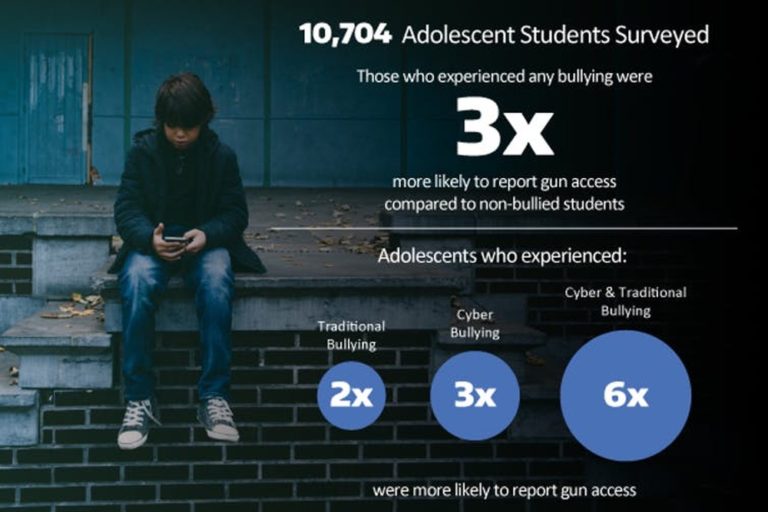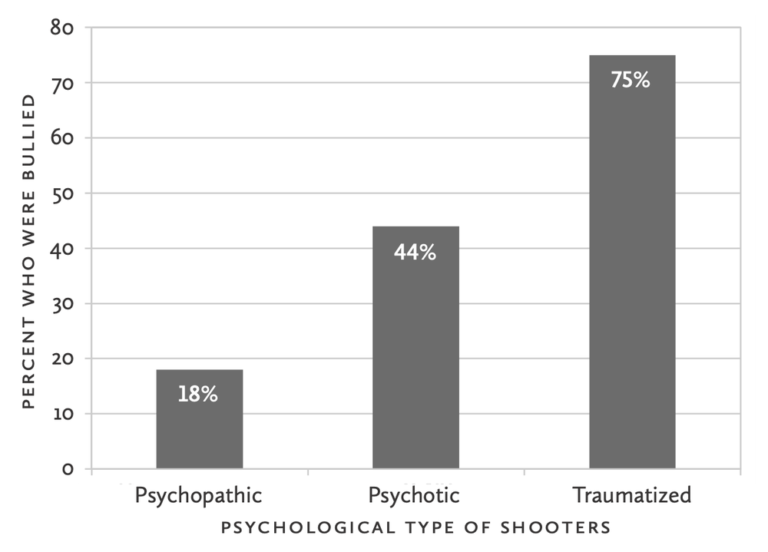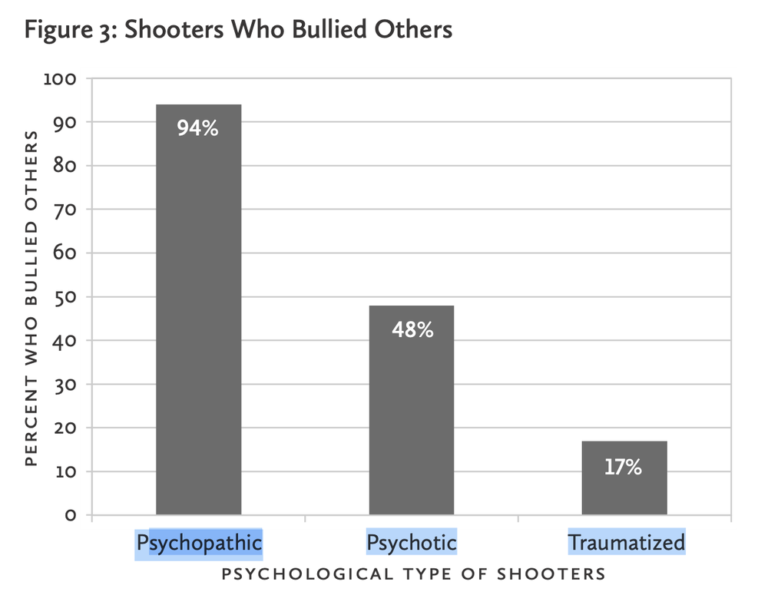Does Bullying Lead To School Shootings? The Difficult Truth.


By Antoine G Larosiliere
Now that schools are about to reopen, I can sense my emotions taking a turn as I think about the question, “Does bullying lead to school shootings?”
One of the few times my children saw me crying is when I had to tell them about the Sandy Hook shooting. Writing this article will be difficult as I try to answer the question “does bullying lead to school shootings?” Will answering this question help save our children’s lives? I certainly hope so. We must begin and end with the truth, no matter how difficult it is for us to consume. If you’re ready to know “does bullying lead to school shootings,” here is the truth of it. Bullying and harassment leads to most school shootings. Many school shooters have experienced trauma from harassment and bullying. Many of these school shooters were also bullies prior to their attacks and were diagnosed with being traumatized, psychopathic, or psychotic. These school shooters usually have home access to guns and are from middle- to- upper-class families. Often their goal is to emulate other school shootings.
According to a research by Dr. Peter Langman, who studied 48 school shooters, he found that “75% of the shooters suffered from trauma.”
75% of school shootings are caused by harassment and bullying.
It’s important to first understand that harassment and bullying can cause trauma. According to Psychology Today, trauma is the experience of severe psychological distress following any terrible or life-threatening event. According to a research by Dr. Peter Langman, who studied 48 school shooters, he found that “75% of the shooters suffered from trauma.” In other words most of the school shooters are traumatized by some form of harassment and bullying, with the rest having some sort of mental illness.
Where do school shooters normally come from?
It’s our natural inclination to assume that school shooters probably come from an environment that is poor with little opportunities. Many of the children from these environments suffer from anger and hopelessness, and that they might as well take their frustrations out on one of the institutions that fail in preparing them. That couldn’t be farthest from the truth. The reality is school shooters are usually from middle- to- upper-class families. In poorer neighborhoods that are already riddled with violence, some of those children may drop out of school. Many end up in the criminal justice system primarily due to systemic racism much earlier than their counterparts from resource-rich communities. Therefore, school might not hold much meaning for these children. You can’t suffer from trauma that was caused by being harassed and bullied, if you’re not at school to be harassed and bullied.
Who’s likely to bring a gun to school?
It’s hard to wrap my brain around how anyone can bring a weapon to slaughter so many innocent children. It’s hard to empathize or even sympathize with the shooters given the horrors that were done by their hands. What about them that makes them more likely to bring a gun to school? Below are a few of those qualities.
- Students who are fighting at school
- Students who skip school out of fear and being threatened or injured
- Students whose sense of safety had been violated or threatened continuously
- Kids who have unexplained bruises or injuries
- Students who seek fame
- Children who are suicidal
- Children who lack social support
- Kids who try to avoid school entirely
- Children who have been badly bullied
- Children who have had a history of disciplinary trouble

What are the potential causes of school shootings?
There are many risk factors that can potentially lead to school shootings. Many of these factors can be found in many people across the globe, but most of us aren’t school shooters. Some of these factors are…
- In some cases, shooters wanted to emulate other school shootings
- Trauma from being severely harassed and bullied
- Mental illnesses
- Children who know they can access their parent’s guns (In many cases the weapons used in the shooting were taken from the parent’s possession.)
What are the signs?
- Absent from school before the attack often because of school suspension
- Someone who keeps blaming others for their problems
- Those who are struggling with a catastrophic loss
- Those who are struggling with being rejected by a boyfriend or girlfriend
- Getting fired from a job
- Children who are pushed too hard by parents.
- Obsession with revenge fantasies
- Researching and reading about other shootings
- Searching other websites that hints to what they’re planning (gun websites)
Are school shooters bullies prior to the shooting?
The idea that school shooters were bullies prior to the shooting is rarely investigated. I guess it just makes more sense to us that shooters are people who eventually get fed up from years of torment, seclusion and abuse, but that’s not the whole truth. According to a research by Peter Langman, PhD, he studied 48 perpetrators and found “approximately 54% of the perpetrators harassed, intimidated, threatened or assaulted people prior to their attacks. Of the 54%, 94% were diagnosed as psychopathic and 48% were diagnosed as psychotic.
What’s the role of mental health?
You’ve probably heard that many of these school shootings are done by children who are mentally ill. That is simply not the case. As a matter of fact, it’s a small percentage of shooters who are mentally ill. A 2006 study in the American Journal of Psychiatry found that only 5% of all violent crimes in Sweden are committed by people with severe mental illness. According to medical experts, “the shooters have given up hope for the future, and seek revenge. They believe they are the victims, and the people they are shooting are villains.”
What can be done
- Enhancing the sense of safety among bullied youth, they might no longer feel the need to engage in weapon carrying at school,”
- Enforce the anti-bullying policies at the school
- Anti-bullying programs can help
- Intervene when we see those red flags in the life of a youngster
- Do not make your firearm readily available to children who might be troubled or mentally ill
- Monitor having access to the point-and-shoot violent video games for troubled or mentally ill children
Bullying is a serious issue with even more serious consequences that affect the global community. If you, your child or someone you care about are being victimized by bullying, or is the one doing the bullying; please encourage them to seek professional help. Healing from trauma is a long enduring process that needs to be handled with love and precision. I hope this has been helpful!
The Bully Experience "Daniel's Story"

Sign up for our newsletter and Read the novel For Free!
Stay updated. Sign up for our newsletter, and get the first two chapters of The Bully Experience Daniel’s Story absolutely free.

